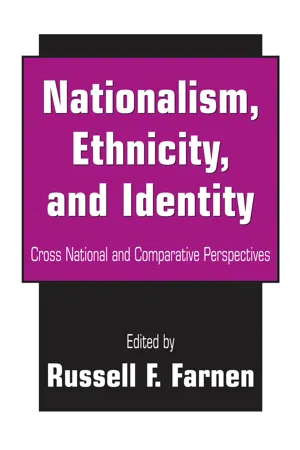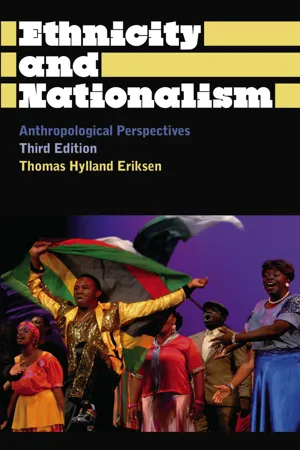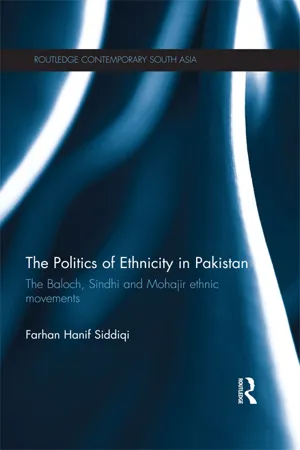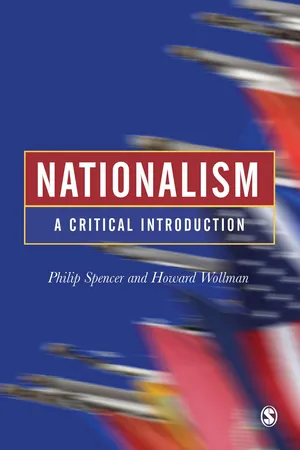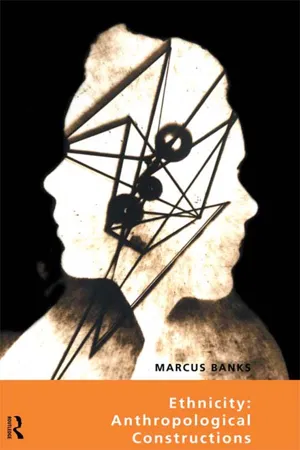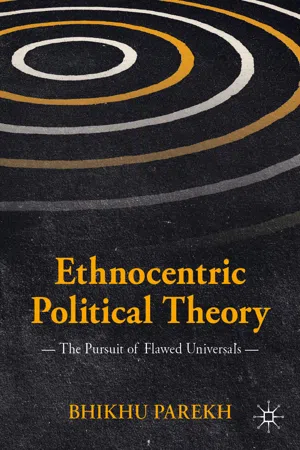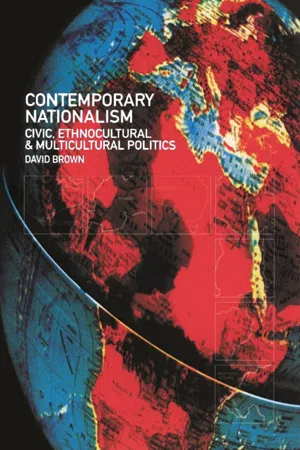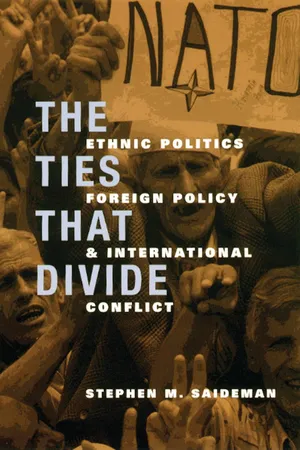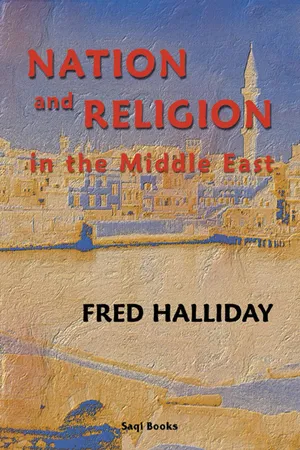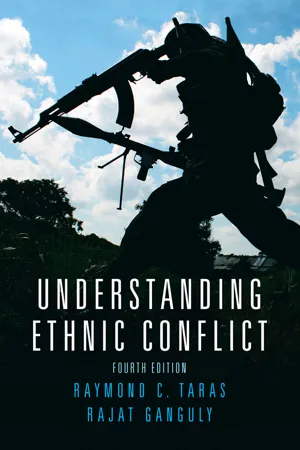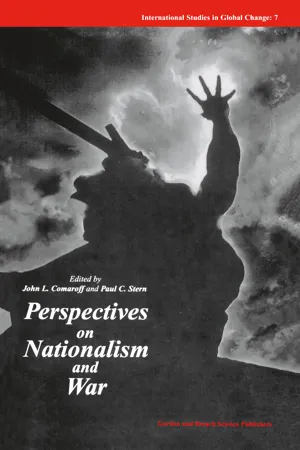Politics & International Relations
Ethnic Nationalism
Ethnic nationalism is a political ideology that emphasizes the importance of a shared ethnic identity as the basis for a nation. It often promotes the idea that a particular ethnic group should have its own independent political and territorial entity. This ideology can lead to exclusionary policies and conflicts, as it prioritizes the interests of one ethnic group over others within a society.
Written by Perlego with AI-assistance
Related key terms
11 Key excerpts on "Ethnic Nationalism"
- eBook - ePub
Nationalism, Ethnicity, and Identity
Cross National and Comparative Perspectives
- Russell F. Farnen(Author)
- 2017(Publication Date)
- Routledge(Publisher)
Santoro (1990) also defines nationalism in a dual sense, both international and domestic. The international definition includes a nation-state that is centralized, independent, sovereign over a territory and population, and based on a cultural awareness of ethnic-linguistic community membership (Santoro 1990, 15-16). The internal definition of nationalism refers to politics based on cultural ethnic background; it emerges when an opposition claims to represent "the nation" against the present state, which only has a public, rather than any natural or preexistent value. The latter definition, of course, ignores the historical dimension of nationalism that helps to legitimize and dignify its existence as an abstraction. This domestic definition of nationalism as a "form of politics" is a result of the outcome of previous attempts to provide self-determination of peoples; this, in turn, resulted in a new group of "oppressed" minorities living within the confines of the newly (or partially) self-determined state. When the communist state system lost its ideological and political legitimacy in 1989, different ethnic nationality groups reemerged, each seeking autonomy, independence, or a larger share of economic and social benefits.Along with minority rights, the reemergence of border questions (regarding territorial legitimacy) is another feature of the current crisis in the dynamic conflicts under way among competing national, state, and ethnic groups. With the demise of totalitarian absolutism and "national fronts," different Eastern European ethnic groups are aspiring to establish a new nationhood (e.g., the Serbs, Croatians, and Muslims in former Yugoslavia), whereas others are aspiring to recover a lost nationality (e.g., in the Baltics, the Czechs and Slovaks in the former Czechoslovakia and the new state of Moldova with Romania). Yet both evidence the resurgence of a revived neonationalism. The former USSR early (in the Constitutions of 1922 and 1936) recognized the danger, difficulty, and endemic nature of the ethnic minority problem by creating a Council (Soviet) on Nationalities as a legislative body parallel to the Supreme Soviet. The "virus" or "demon" of nationalism and ethnicity, however, has arisen not only in the former USSR but also throughout Eastern Europe, complete with histories, symbols, flags, myths, and a new consciousness-all of which have radically transformed the former stability of the internal Soviet system, the Eastern hegemonic system, and bipolar relations. It is even conceivable that, despite forty years of Western European denationalization and Europeanization in the Atlantic community and EEC, an imitation effect may have unleashed nascent French, Danish, or English national sentiments, setting back the post-Maastricht course of European political integration for a time (Santoro 1990, 17-33). With the growth of neonationalism, there has also reemerged a rebirth of Islamic religious fundamentalism and anti-Western pan-Arabism. Such deep- seated loyalties to God or nation also do not auger well for either progress in human rights or increased ethnic toleration or religious pluralism. - eBook - ePub
Ethnicity and Nationalism
Anthropological Perspectives
- Thomas Hylland Eriksen(Author)
- 2010(Publication Date)
- Pluto Press(Publisher)
movement is one actuated by sentiment of this kind. (Gellner, 1983: l;cf. Gellner, 1978: 134)While this definition at first glance may seem a straightforward one, it turns out to be circular. For what is the ‘national unit’? Gellner goes on to explain that he sees it as synonymous with an ethnic group – or at least an ethnic group which the nationalists claim exists: ‘In brief, nationalism is a theory of political legitimacy, which requires that ethnic boundaries should not cut across political ones’ (Gellner, 1983: 1; cf. also Gellner, 1997). In other words, nationalism, the way the term is used by Gellner and other contemporary social scientists, explicitly or implicitly refers to a peculiar link between ethnicity and the state. Nationalisms are, according to this view, ethnic ideologies which hold that their group should dominate a state. A nation-state, therefore, is a state dominated by an ethnic group, whose markers of identity (such as language or religion) are frequently embedded in its official symbolism and legislation. There is a drive towards the integration and assimilation of citizens, although Gellner concedes that nations may contain ‘non-meltable’ people, what he calls entropy-resistant groups. More of them later.In another important theoretical study of nationalism, the South-East Asianist and political theorist Benedict Anderson proposes the following definition of the nation: ‘it is an imagined political community – and imagined as both inherently limited and sovereign’ (1991 [1983]: 6). By ‘imagined’, he does not mean ‘imaginary’, but rather that people who define themselves as members of a nation ‘will never know most of their fellow-members, meet them, or even hear of them, yet in the minds of each lives the image of their communion’ (1991 [1983]: 6). Unlike Gellner and many others, who concentrate on the political aspects of nationalism, Anderson is concerned to understand the force and persistence of national identification and sentiment. The fact that people are willing to die for their nation, he notes, indicates its extraordinary force. - eBook - ePub
The Politics of Ethnicity in Pakistan
The Baloch, Sindhi and Mohajir Ethnic Movements
- Farhan Hanif Siddiqi(Author)
- 2012(Publication Date)
- Routledge(Publisher)
First, emotions or emotive appeal are context dependent. Political mobilisation within an ethnic group is not a function of emotions as emotions are not a cause but an effect. The cause of heightened emotions are related to conditions of domination, neglect and isolation which an ethnic group perceives subjectively (which Connor ignores) and then embarks upon creating a political voice in response to such conditions. When the political voice gains momentum, emotions related to group feelings of unity based on common descent, kinship and blood ties etc., are consequently aroused. Thus, it is not emotions which dictate political mobilisation, it is the political conditions which intensify emotions and lead to the creation of an ethnopolitical movement. It is safe to assume that as citizens of the modern nation-state, all ethnic groups are affected by decisions of the central decision-making authority and that such decisions have a significant effect in both attenuating as well as intensifying the feelings of ethnonationalism.Second, a more powerful and persuasive explanation of the rise of nationalism in both the developed and developing world has to do not with the emotive appeal of ethnonationalism, but rather its ideological prowess as a doctrine of resistance authenticated and legitimated by the international community and exemplified in President Woodrow Wilson’s Fourteen Points.17 In the twentieth century, and especially since the First World War, the idea of nationalism and national self-determination spread into every nook and cranny of the world engendering an incipient basis of anti-colonial nationalism which brought down colonial powers and their rule.18 Nationalism, according to such an interpretation, then qualifies as an ideology of resistance or as a legitimate organising principle of politics which nations and ethnic groups espouse in order to claim rights and thwart oppression. In the words of Benedict Anderson:The reality is quite plain: the ‘end of the era of nationalism,’ so long prophesied, is not remotely in sight. Indeed, nation-ness is the most universally legitimate value in the political life of our time.19Nationalism as an ideology and political principle in the developing world came primarily through the colonial state. This subject is an important part, yet unfortunately, an understated strand of a brilliant work on nationalism by Benedict Anderson. The most profound and the most commented on, debated and analysed bit concerns Anderson’s emphasis on the rise of modern industrial technology (capitalism), its associated industry relating to vernacular press (print-capitalism) and through the latter the eradication of communication barriers between people living within a territory. The Enlightenment, according to Anderson, played a key role in the development of nationalism, as ecclesiastical authority lost its hegemony which signalled the collapse not only of religion but also of its associated language, Latin. The Latin language was now replaced with a vernacular language and coupled with the rise of print-capitalism it heralded the rise of nationalism as communication barriers broke down and people began to ‘imagine’ themselves as a nation. According to Anderson, the driving classes behind nationalism were the educated bourgeoisie who ‘were the first classes to achieve solidarities on an essentially imagined basis’.20 - eBook - ePub
Nationalism
A Critical Introduction
- Philip Spencer, Howard Wollman(Authors)
- 2002(Publication Date)
- SAGE Publications Ltd(Publisher)
If a writer like Smith sees ethnic and national identities as highly overlapping concepts, can we make a clear distinction between them? Thomas Eriksen, who has made one of the most systematic attempts to address the relationship between ethnicity and nationalism is forced to conclude that they are ‘kindred concepts’ (1993, p. 118). For him the majority of nationalisms (but not all) are ethnic in character. But only some ethnic groups are proto-nations and form ethnonationalist movements. ‘A nationalist ideology is an ethnic ideology’, he writes, ‘which demands a state on behalf of the ethnic group’ (p. 118). In practice this distinction is often blurred. On the one hand, some nationalisms, as in the USA or Mauritius, are based on other civil ties or on multi-ethnic groups. (We discuss the validity of the distinction between civic and Ethnic Nationalism in Chapter 4.) On the other hand, many movements that we may wish to classify as nationalist have demands – for greater autonomy or recognition within an existing state – which fall short of demands for full independent statehood (see Chapter 6). 9 Culture, belief and national identity If ethnicity often seems to rest on relationships that are infused with structures of power and inequality, is there then some other way in which we can explain the basis of national identity? Many writers have turned to the idea of culture as an explanatory tool for this purpose. Indeed it is often implicit in concepts of identity and ethnicity themselves. We have seen above, for example, how Smith emphasizes the importance of beliefs and culture in the construction first of ethnic then of national identity. Although many modernists reject the ethnic part of this argument, they nevertheless take very seriously the idea that there are a set of beliefs and a national culture, common to and shared by all members of the nation, which form the basis of a given national identity - eBook - ePub
- Marcus Banks(Author)
- 2003(Publication Date)
- Routledge(Publisher)
So what are these theories of nationalism? Taking a very broad brush approach, earlier theories tended to typologize, tended to be highly Euro-centric, and tended to assume that nationalism is an explicit political ideology, invented at a certain time and for a certain purpose (see, for example, Kedourie 1960; Kohn 1944). Later theories have tended to take a more anthropological approach, to see nationalism more as a process than a conscious ideology, and to be less Euro-centric. It is these later theories I shall discuss, as they are more generally relevant to a study of ethnicity. First, some general outlining is called for.The chances are extraordinarily high that few if any of the readers of this book have not grown up in a nation state, or unaware of the existence of nation states. Even if you consider yourself Welsh, or Scottish, or Catalan, and feel that your national identity is illegitimately denied political and territorial manifestation (this could also be true if you consider yourself English), you have grown up in a world which from the nineteenth century or so onwards has understood there to be a natural congruence between a country's name (however often changed), a fixed territory (however much disputed), a group of people who are considered citizens (however varied they are), and a political system that administers that country in the name of its people (however much despised). Nationalism is an idea, to quote Ernest Gellner, ‘so very simple and easy that anyone can make it up almost at any time, which is partly why nationalism can claim that nationalism is always natural’ (1983:126; emphasis in original).If you are white, if you are European or North American of ‘old stock’ ancestry, it is quite possible that you may have read the previous two chapters without feeling the issues of race or ethnicity discussed had any personal relevance to you. Only white South Africans and certain others would be conscious of being of ‘white race’ for most of their lives, only ‘ethnic minorities’ would be conscious of ethnicity. Of course, if race and ethnicity have any significance at all, they have it on both sides of any boundaries they mark, so the illusion of feeling not touched by them is just that, an illusion. But nationalism is slightly different; there is, apparently, no other side to the boundary in the contemporary world, no obvious condition of non-nationalism. There are few, if any, ‘tribes’ in the world that are not involved at some level with the states whose borders they now live within, and which claim a seat at the United Nations in their name. And trans-national groupings such as the European Union are rare, fragile and constantly threatened by the interests of their national member states. - eBook - ePub
Ethnocentric Political Theory
The Pursuit of Flawed Universals
- Bhikhu Parekh(Author)
- 2019(Publication Date)
- Palgrave Macmillan(Publisher)
© The Author(s) 2019 Bhikhu Parekh Ethnocentric Political Theory International Political Theory https://doi.org/10.1007/978-3-030-11708-5_14Begin Abstract14. Ethnocentricity of the Nationalist Discourse
Bhikhu Parekh1(1) Politics and International Relations, University of Hull, Hull, UKBhikhu ParekhEnd AbstractKeywords
State Nationalism Forms of non-Western nationalismThe first half of the nineteenth century marked the emergence of a new mode of political discourse, and gave rise to such political doctrines as liberalism , conservatism, socialism, anarchism and nationalism . Of these, nationalism , which is logically different from the others, has proved the most elusive and difficult to define. We have a reasonably clear idea of who is a liberal, a conservative or a socialist, or at least what their basic moral and political commitments are. We are not sure what nationalism stands for and disagree about its origins, paradigmatic examples, nature, variety and content.1For some commentators nineteenth-century German writers such as Fichte, Herder and Schleiermacher are the true nationalists2; for some others France is the birthplace of nationalism and Rousseau is its first theorist.3For some, nationalism is a political doctrine about how states should be organised4; for some others it is synonymous with collective egoism5; for yet others it refers to a determined attempt by a country to guard its distinct identity against external influences. Again, for some commentators, nationalism refers to the love of one’s country and its way of life and is synonymous with patriotism6; for some others, it is an exclusive and aggressive form of patriotism7; for yet others it is a wholly different kind of sentiment.8Thanks to these and related disagreements, the discussion of nationalism lacks clarity and focus and leads to the blurring of important distinctions. We forget that one might glorify the state but not the nation (Hegel ), the nation but not the state (Herder ), both at different levels (Fichte ), society and neither the state nor the nation (Rousseau ) or race but none of the other three (Gobineau). We also promiscuously combine the term nationalism with several others in such expressions as cultural, religious, linguistic, ethnic, civic and territorial nationalism , without asking if the term rightly applies to them and what it is supposed to convey. Since much of the nationalist discourse originates in and concentrates on the West, especially Europe, there is a tendency to universalise the European experience, and imagine that nationalism - eBook - ePub
- David Brown(Author)
- 2003(Publication Date)
- Routledge(Publisher)
It is clear that individuals do in fact identify in varying degrees and in varying situations, with a wide range of groupings based on affiliations of, for example, ideology, occupation, class, gender or locality; as well as on affiliations of ethnicity and nationalism. The particular prevalence of the latter ethnic and national affiliations cannot, from the situationalist perspective, be explained by arguing that they have any innate priority over other possible affiliations. Instead, it is argued that they are prevalent because they appear to offer particular utility to individual and group interests in the context of contemporary situational opportunities and threats. They do this in various ways. Ethnicity and nationalism often refer to easily identifiable identity markers, such as language or clothing, which facilitate political mobilisation. They also frequently refer to the social interaction networks within which individuals develop their ‘way of life’, so that it might seem rational for such individuals to defend the interests connected with that way of life. Ethnic and national claims also have an important advantage over other attachments which cannot so easily portray themselves as natural, in that they can more easily clothe the interests being defended in the language of natural rights, and thereby provide particularly effective ways to strengthen a bargaining position.From the situationalist perspective, the term ‘ethnicity’ is sometimes used to refer to communities making claims for cultural autonomy, whereas the term ‘nationalism’ is used where territorial homeland claims are being made; but the distinction is a permeable one since both refer to the political defence of rational attachments to the interactive community.There seem, however, to be several problems with trying to provide a rational-choice explanation for political affiliations which are not perceived as rational choices by those involved, which are emotionally powerful, and which clearly sometimes impel people to acts of irrational prejudice and hatred. But the problems might be more apparent than real. First, emotions may surely be either irrational or non-rational in the sense that they can either distort our perceptions of the world, or can comprise reactions which complement rationality. It would be difficult to argue, for example, that it is irrational for us to become afraid in the face of attack, or to become emotionally involved in the defence or pursuit of those interests which we consider to be most central to our life goals. - eBook - ePub
The Ties That Divide
Ethnic Politics, Foreign Policy, and International Conflict
- Stephen Saideman(Author)
- 2001(Publication Date)
- Columbia University Press(Publisher)
Civic nationalisms may have less clear implications for foreign policies than Ethnic Nationalisms, as the content of the particular civic nationalism varies from state to state. 67 The content matters as it shapes the definition of friends, enemies, and acceptable policies. For instance, Indian nationalism requires an independent, anticolonial foreign policy. 68 Because political competition drives this process, we should expect behavior to vary as competition varies among states. 69 Generally, all politicians should care about their supporters, even if they face relatively less competition because all politicians are “running scared.” 70 That is, more support means more power, and although the defection of supporters may not mean the immediate loss of power, their departure generally leaves politicians weaker than if they had not defected. Still, politicians facing less competition are somewhat more autonomous than those who must worry very much about the defection of a few supporters. Hence, while ethnic ties should influence the foreign policies of all states having such ties, the states most likely to develop policies that run counter to the ties of the leader’s constituents are those where competition is relatively less intense. In other words, we should expect all politicians facing high competition to support the side with which they have ethnic ties, and we should expect most, but not all, politicians feeling less competitive pressures to behave similarly. The role of competition here separates this theory of ethnic politics and foreign policy from approaches focusing purely on the power of nationalism without considering how ethnicity plays out through the political process. 71 Such approaches assume that all countries with a given ethnic identity will give support to ethnic kin elsewhere because of the emotional bonds of their citizens. However, these arguments ignore the political process - eBook - ePub
- Fred Halliday(Author)
- 2013(Publication Date)
- Saqi Books(Publisher)
rossianin , the last being an ancient term revived after 1991 by Yeltsin and his associates.Here again we see the tension between the aspiration of nationalism and the reality. Nationalism seeks to assert one common, timeless, unitary identity: in fact there are always different levels, and the definition for any individual or group changes over time. Again, modernity condemns everyone to having a national identity, but it also constantly shifts the terms and context of such a definition. Nor have I yet introduced politics, everywhere the most important factor of all: political movements and states shift their definitions and the combination of elements as they see fit. Thus Egyptian leaders have switched, from the time of Saad Zaghlul and the Wafd Party onwards, between the Egyptian, the Arab and the Islamic, depending on the needs of the moment. Gershoni and Jankowski have written extensively on the history of this ‘misrification’.17 When Nasser wanted to impose his will on Syria and other Arabs, he stressed the qaumi. When Sadat wanted to make his peace with Israel and downplay his responsibility for the Palestinians he stressed the qutri. Within Zionism, there has been a parallel evolution – as the relation between secular and religious, and between socialist and free market, definitions illustrates.As for religion, in varying degrees it does play a role in the national ideology of Middle Eastern states. Even the most secular, such as Atatürk’s Turkey or post-independence Zionism, deploy terms that have religious origins. But etymological origins do not give contemporary meaning: I share with orientalist scholars, notably Bernard Lewis, an interest in and vigilance about the etymology of words, but would use etymology not to define present meanings but rather to begin charting how over time words acquire new meanings and often end up meaning something very different from what they meant before. Thus even the most secular of nationalisms has words of religious origin. This is separate from the fact of movements and ideologies that make explicit use of religion, and which formally proclaim it as part of their programme. But here too we are not looking at a uniquely Middle Eastern phenomenon, or one that would disqualify these from being considered nationalist. If one thinks of European nationalisms, whether those of Western Christianity in Ireland, Poland or France, let alone of Eastern Christianity, in Greece, Serbia, Russia or Bulgaria, then in each case the issue of religion is present. There is moreover the issue of instrumentality. In these instances it is as much a case of the political movement using, or framing, the religion as the other way around; in the longer run it is the need of the state that shape the requirements of religion. - eBook - ePub
- Raymond Taras(Author)
- 2015(Publication Date)
- Routledge(Publisher)
Instead, it believed “that ethnic groups have overt, tangible interests that can be pursued in a rational, utility maximizing manner,” which meant that “tradeoffs and bargaining are possible, and ethnic violence can be ended by changes in policies of allocation of power and wealth.” 69 The role of the state under this scheme is not that of an “oppressor, but as a mediator and facilitator; and in order to play this role it must reject an exclusivist approach to access to power in favor of an inclusive strategy based on ethnic balancing.” 70 Rothchild found that national governments in many postcolonial African states such as Nigeria, Mauritius, Togo, Ivory Coast, Zambia, Kenya, and Zimbabwe were often a hegemonic coalition of representatives belonging to various ethnic groups and regions. The Third Wave: Resource Competition and Ethnic Nationalism A more instrumentalist explanation for the politicization of ethnic identity and outbreak of ethnic conflict was developed in the late 1970s and early 1980s by the resource competition approach. It posits that in multiethnic societies, large-scale ethnic identity formation and politicization is promoted when various ethnic groups are forced to compete with each other for scarce resources and rewards. 71 Such competition may lead to the rise of ethnic political movements if a group’s “previously acquired privileges are threatened or alternatively when underprivileged groups realize that the moment has come to redress inequality.” 72 At such moments, ethnic groups may come to develop a perception of relative deprivation, which can be defined as “the perceived discrepancy between value expectations and value expectancies in a society”; in other words, ethnic groups are more likely to mobilize politically for collective action if they come to believe that they have received less (their expectations) than what they deserve (their expectancies). 73 The perception of relative deprivation builds gradually over several stages - eBook - ePub
- J. Comaroff, P. Stern(Authors)
- 2013(Publication Date)
- Routledge(Publisher)
per se , only a theory of history and consciousness capable of elucidating the empowered production of identities. I will not repeat my argument here, save to underscore four things:First, ethnicity typically has its origins in relations of inequality: ethnogenesis is most likely to occur through social processes in which culturally defined groups—constituted in a dialectic of attribution and self-assertion—are integrated into a hierarchical social division of labor.Ethnic identities, as this implies, are always caught up in equations of power at once material, political, symbolic. They are seldom simply imposed or claimed; more often their construction involves struggle, contestation and, sometimes, failure.Second, the making of any concrete ethnic identity occurs in the minutiae of everyday practice; most notably, in the routine encounters between the ethnicizing and the ethnicized. The registers of its construction are at once economic and aesthetic. They involve, simultaneously, the mundane production of both objects and subjects, signs and styles. Usually, too, they are gendered—women, their bodies, and their dress often being prime sites for the re-presentation of difference. And they are built from the fluid ensemble of symbols, values and meanings that compose a living, historical culture.Note that “culture” is not taken here, in the old anthropological sense, to denote a closed system of symbols and meanings. It is seen, instead, as a contested field of historically contrived, socially situated, relatively empowered, always evanescent signs and practices (Comaroff and Comaroff 1991:19ff).
Index pages curate the most relevant extracts from our library of academic textbooks. They’ve been created using an in-house natural language model (NLM), each adding context and meaning to key research topics.
